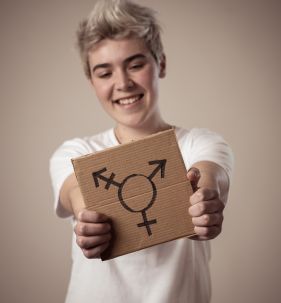Navigate the world of intersex dating with confidence and ease with this insightful guide!
Those who are intersex may have differences in their bodies, hormones, or genetics that don't fit the usual categories of male or female. Being intersex is a part of natural human diversity, but these individuals have often been discriminated against and stigmatized.
This article raises awareness about intersex people and helps eliminate the stigma around their experiences.
What Is Intersex?
Intersex is a term used to describe a range of physical and hormonal differences that occur in individuals. These differences may exist in a person's reproductive organs, hormones, chromosomes, or secondary sexual characteristics.
Intersex conditions can be classified into several categories, including androgen insensitivity syndrome, Turner syndrome, Klinefelter syndrome, and congenital adrenal hyperplasia, among others.
The actual frequency may be higher since some intersex traits may not be detected or reported. Additionally, some intersex conditions are so mild that affected individuals may not realize they have them.
It is also worth mentioning that the definition of what constitutes an intersex condition varies, and some estimates of intersex frequency may differ depending on the criteria used. Overall, however, intersex conditions are considered to be a relatively common occurrence in the general population.
In the past, intersex people were often subjected to medical interventions to make their bodies conform to binary sex norms, and there was limited public discussion about the issue.
In recent years, however, there has been a growing movement to raise awareness and promote greater understanding and acceptance of intersex people and their experiences.
How Intersex Is Different from Other Gender Terms
Transgender and transsexual individuals are people whose gender identity differs from the sex they were assigned at birth. In other words, they identify as a gender that is different from the one that was assigned to them based on their physical characteristics.
Intersex, on the other hand, refers to individuals born with physical or genetic traits that don't fit typical binary notions of male or female bodies. Intersex people may or may not identify as transgender or transsexual, and some may identify as male, female, both, or neither.
In short, being transgender or transsexual is a matter of gender identity, while being intersex is a matter of biology and physical characteristics. The two concepts are separate but can overlap in some individuals.
Stigma and Discrimination
Intersex individuals have long been stigmatized and discriminated against due to their physical differences. The medical community has perpetuated this stigma by performing non-consensual surgeries on intersex infants and children to try to make their bodies conform to societal norms of male or female.
This has led to a lack of understanding and acceptance of intersex individuals and has resulted in psychological harm, isolation, and a lack of access to adequate medical care.
The Importance of Intersex Awareness
Breaking the stigma and increasing intersex awareness is essential for creating a more inclusive and understanding society. By educating others on intersex conditions and the experiences of intersex individuals, we can work toward reducing discrimination and promoting equality. It's also important to acknowledge the diversity within the intersex community and to celebrate differences rather than attempting to eliminate them.
Intersexuality and Dating
Dating may be tough for everyone, but it can be especially difficult for intersex people.
However, intersex persons must realize that they, like everyone else, are deserving of love and respect.
Here are some pointers to help intersex people negotiate the dating scene:
Embrace your identity: Intersex is a natural and normal variety, and being proud of who you are is essential in finding a spouse who will respect and love you for who you are. Consider being open and honest about your intersex status with possible partners if you feel comfortable doing so. This can aid in the development of trust and understanding.
Seek out helpful communities: Consider participating in online forums or in-person groups where you may interact with people who have gone through similar circumstances.
Learn more about intersex and educate others: Learning more about intersex and educating others can help decrease stigma and encourage understanding.
Be patient: It may take some time to find the perfect individual, but it is well worth the wait. While you continue your quest, focus on self-care and finding joy in your life.
It's critical to remember that everyone's dating experiences are unique, and there is no one proper way to negotiate the dating world as an intersex person. The most important thing is to be true to yourself and to find a partner who accepts and loves you for who you are.
Advocating for Intersex Rights
Intersex individuals have the right to bodily autonomy and self-determination, including the right to make informed decisions about their medical treatment. Advocates for intersex rights are working to change harmful medical practices, such as non-consensual surgeries, and to raise awareness about intersex issues. It's important to support and amplify the voices of intersex individuals and organizations working toward creating a more inclusive world.
Conclusion
Breaking the stigma and increasing intersex awareness is crucial for creating a more inclusive and understanding society. By educating others and advocating for intersex rights, we can work toward reducing discrimination and promoting equality for all. It's time to embrace the diversity within the intersex community and celebrate differences rather than trying to eliminate them.
Personalized Recommendation

Get your personalized recommendation
Get more info...




